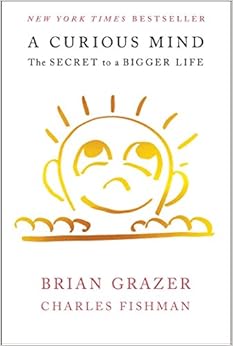 Hey guys!
Hey guys!
So, I recently had the pleasure of reading A Curious Mind by Brian Grazer, the highly-respected and spiky-haired producer behind TV shows such as 24 and movies such as The Da Vinci Code and Frost/Nixon.
Grazer attributes his success in work and life in large part to his curious nature. He’s not afraid to ask questions and he intentionally seeks out inspiration and understanding. For decades, he has made a point of finding people whom he considers to be interesting for their life experience, their knowledge, and going to great lengths to arrange meetings with those people to learn from them in some way, shape or form – from Fidel Castro to Oprah Winfey. He calls these meetings “curiosity conversations”.
While I was reading this book I thought to myself, how curious am I? Certainly, I would consider myself an intelligent person and I read a fair amount, But how often do I let myself follow the breadcrumbs? How often do I seek out information from people? And when I am engaged with others, do I really dig in and ask questions or do I just sit back and let the other person talk, sharing what they will? What could be gained from that new mindset?
And so I thought I would try really digging in and approaching every interaction with a truly curious mind and I realized that I had been missing so much! There was so much to learn that I was letting slip by because I wasn’t as engaged as I could have been.
It’s rather new development but I’ve already been inspired by it and have noticed a difference in my creativity. I have been asking more questions of people and where they come from and it gives me new ideas to think about. When I come across something that intrigues me, I’m trying not to put it in my back pocket and say, “Oh, I’ll check it out at some point,” knowing that I probably never will. I’m trying to follow up and check it out.
Could you be more curious? What do you think would happen if you saw life as an adventure, something to really explore and investigate?
When you approach life with curiosity, you can be taken down roads you never expected. And, as a creative person, the new and unexpected is always fun, isn’t it? So, let’s take a page out of Brian Grazer’s book – literally! – and begin cultivating our curious minds!
Have a great day!








 Hey Guys!
Hey Guys!